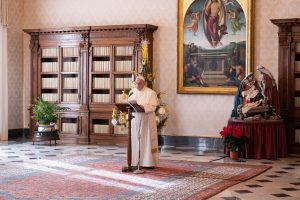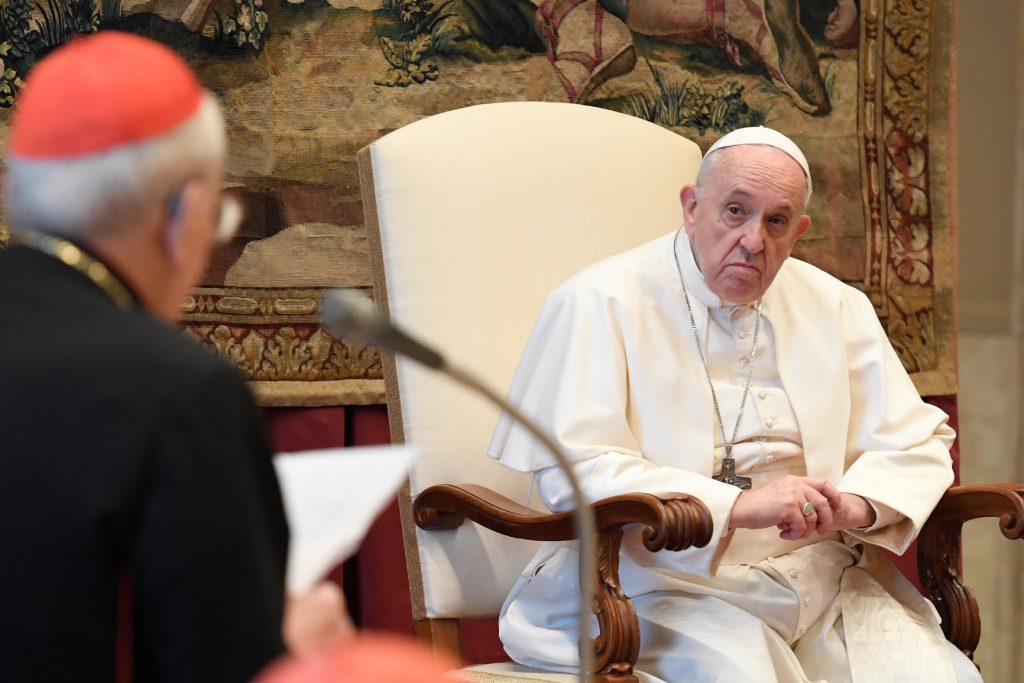ROSARIO, Argentina — The COVID-19 pandemic has absorbed most of the Catholic Church’s attention during 2020, and probably will continue to do so during the early months of 2021. But what comes after?
There are a few issues we can expect will dominate Rome’s agenda, particularly if Pope Francis has his way: the family, reform of the Church’s government, and the survival of Christianity in the Middle East.
For Church watchers, much of the attention during Pope Francis’ papacy has been given to “hot button issues,” a trend set by the Synod of Bishops. When prelates from around the world met in Rome in 2014 and 2015 to discuss the Church’s response to family issues, most of the media’s attention was centered on whether Pope Francis would provide an opening for civilly remarried Catholics to receive holy Communion. His 2016 post-synodal apostolic exhortation, “Amoris Laetitia” (“The Joy of Love”), provided a narrow opening for that.
To mark the fifth anniversary of “Amoris Laetitia’s” publication this coming March, Pope Francis recently declared that 2021 would be a year dedicated to the family, leading up to the 10th World Meeting of Families in Rome in 2022. The pope’s intention, it seems, is to bring the Church’s approach to family issues back into the news cycle — and the center of parish life.

During the 2019 Synod of Bishops on the Amazon region, attention turned to the question of whether the pope would move to allow for married men to be ordained to the priesthood and the ordination of women as deacons. He ultimately did neither, and for Pope Francis the synod was not about these “hot-button issues,” but about rather calling the Church to an evangelization effort that would allow the faith to thrive in remote regions that sometimes see a priest once a year.
Many Catholic bishops and laity, particularly in Germany and the U.S., but also elsewhere, will continue to beat these drums on celibacy and ordination of women as they have been doing for decades, but the Argentine pontiff has closed the doors to both. And there’s nothing that Pope Francis will allow for those issues to dominate his agenda in 2021.
Yet 2021, the eighth year of a papacy most Church-watchers expected would not get this far, will have another Synod of Bishops, this time centered on the theme of “synodality.”
While “ad intra” the debates that dominated the discussion were “West” focused — the reform of the curia, episcopal collegiality, ordination of women, celibacy, the fight against sexual abuse, “ad extra” Pope Francis has tried to engage broader religious and social questions, including reducing poverty, forging a lasting peace on the global level, fighting environmental devastation, and advocating for integration of migrants and refugees. So far, he has tended to side with the United Nations and the European Union more than with individual countries on these issues.
Far from being a “transition” year, 2021 will give Pope Francis the opportunity to cement several of the reforms he was elected to accomplish, including that of the Roman Curia, the Church’s central government, and that of the Church’s approach to fighting clerical sexual abuse.
But it will also give him an opportunity to redirect the Church’s gaze toward an issue dear and close to him, which he began exploring in 2019, during his trip to the United Arab Emirates, and then again in 2020, with his encyclical letter “Fratelli Tutti”: human fraternity.
He will dedicate some of his energy to finishing the reform of the Curia, a task that began with his election in 2014. As South African Cardinal Wilfrid Napier stated as recently as last week on Twitter, “the fact is that in the consultations before the conclave [that elected Pope Francis] repeated calls were made for a thorough reform of the Church beginning at the center, the Vatican. This would then serve as a model at diocesan and parish levels.”
On an external level, that reform is expected in the shape of a new apostolic constitution to be announced in 2021 that will reorganize the city-state’s bureaucracy. If the last eight years are any guide, however, Pope Francis will repeat his call for members of the Curia to undergo a more internal, personal conversion, rather than simply subject them to a mere “personnel reform.”
At the core of Pope Francis’ 2021 agenda will be human fraternity, a topic that, like a polyhedron, has many faces and meanings. For the pope, it’s mostly a path toward peace: by acknowledging that we’re brothers and sisters, violence in God’s name becomes unjustifiable. Once that idea is set, it’s possible to start rebuilding trust in places such as Iraq and Syria, torn by violence perpetrated by ISIS, or in South Sudan, devastated by an on-again, off-again civil war.
“The painful events that marked humanity’s journey last year, especially the pandemic, taught us how much is necessary to take an interest in others’ problems and to share their concerns,” Pope Francis said during his Angelus prayer on Jan. 1, the Vatican-sponsored World Day of Peace. “This attitude represents the path that leads to peace, because it fosters the construction of a society founded on fraternal relationships.”
Each person, he argued, is called to make peace happen every day, without letting indifference, rejection, and rivalry prevail.

In few places in the world Christians need this idea to succeed more than Iraq, one of the earliest homes of Christianity, and that today has only an estimated 150,000 faithful left, according to the papal charity Aid to the Church in Need. It’s a sharp decline from before the 2003 U.S.-led invasion, when there were 1.5 million.
With Pope Francis’ only scheduled trip for 2021 thus far being Iraq, in early March, not only will “human fraternity” continue to be a trend in his ministry, but he will bring back attention toward a region that was once a stronghold of the Catholic Church.
The Son of God was born in what today is the Middle East, and the apostles walked these lands on their way toward Rome and the rest of the world. The “first Christian communities” were from the Middle East, and though their presence might be small in number, the pontiff is convinced they are a beacon of hope that, God and humanity willing, will remain lit.
That’s why bringing back hope for peace in a region where generations of people knew nothing but war, is the kind of “comeback” Pope Francis can be expected to push for in 2021.

